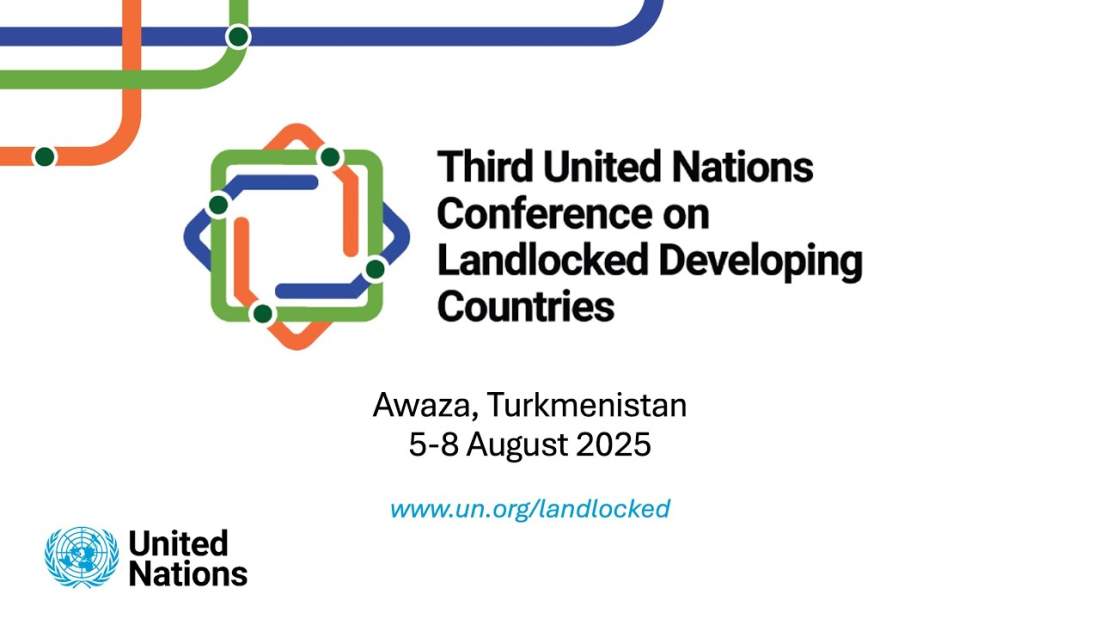Pakistan, Afghanistan trade strikes; ‘open war’ warning issued
Afghan and Pakistani forces traded airstrikes and artillery fire along the Durand Line on Thursday night, killing dozens on both sides, as Pakistan’...

High-ranking delegations from UN member states, business leaders, and representatives of international financial institutions will gather in Turkmenistan for a UN conference aimed at supporting developing countries whose economies are often “locked out” due to lack of access to the sea.
Turkmenistan's national resort will host the Third UN Conference on Landlocked Developing Countries (LLDC3) under the theme “Driving Progress Through Partnerships”, scheduled for 5th - 8th August.
UN Secretary-General António Guterres is expected to attend.
A once-in-a-decade UN conference will push for freer transit, smarter trade corridors, stronger economic resilience and fresh financing to lift development prospects for the 570 million people living in 32 landlocked developing countries.
According to the World Bank, LLDCs’ trade costs are more than twice that of coastal countries and those costs are increasing. While they represent 7 percent of the world’s population landlocked countries’ share of global exports is just 1.1 percent.
These countries also face geographical challenges. More than half of landlocked countries are drylands, adversely affected by desertification and drought. Many are mountainous, suffering from melting glaciers, water shortages and declining biodiversity.
The upcoming conference will aim to break the cycle of poverty, foster social mobility, and plan investments in education, healthcare and livelihoods. The focus will be on trade, regional integration and support for small businesses, the UN statement reads.
The four-day event will feature plenary sessions, five high-level roundtables, and a Private Sector Forum focused on building partnerships and boosting investment. Forums with parliamentarians, women leaders, civil society, and youth will ensure diverse voices from across society are involved in the discussions.
Agenda of the conference will be focused on implementation of the Awaza Programme of Action for 2024-2034, adopted by the UN General Assembly in December.
It lays out five priority areas – structural transformation, infrastructure and connectivity, trade facilitation, regional integration, and resilience building – supported by five flagship initiatives.
These include:
- A global infrastructure investment facility to close financing gaps.
- Regional agricultural research hubs to boost food security.
- A high-level UN panel on freedom of transit, ensuring smoother cross-border flows.
- Digital connectivity initiatives to bridge the digital divide.
- A dedicated landlocked developing countries trade work programme at the WTO.
The death toll from heavy rains and flooding in Brazil’s Minas Gerais state has risen to 46, authorities said, with 21 people still reported missing. The storms triggered landslides and widespread flooding, displacing thousands across Juiz de Fora and Uba.
The situation in Cuba was heating up and called for restraint following a deadly incident involving a Florida-registered speedboat off the coast of the Caribbean island, the Kremlin said on Thursday (26 February).
Syria’s economy is showing clear signs of recovery, with economic activity accelerating in recent months, the International Monetary Fund (IMF) said on Wednesday.
The United States has deployed the aircraft carrier USS Gerald R. Ford near Israel as part of a growing military build-up amid tensions with Iran, while governments around the world urge their citizens to leave parts of the region.
Pakistani air strikes hit a weapons depot on the western outskirts of Kabul overnight, triggering hours of secondary explosions that rattled homes across the Afghan capital and left residents fearing further violence.
Pakistani air strikes hit a weapons depot on the western outskirts of Kabul overnight, triggering hours of secondary explosions that rattled homes across the Afghan capital and left residents fearing further violence.
Pakistan’s declaration of an “open war” with Afghanistan must be understood in the context of months of escalating violence, regional analysts have said, describing the latest developments as a significant shift in the nature of the conflict.
Israeli strikes killed five people in Gaza on Thursday (26 February), according to health officials in the territory. The Israeli military said separately that it had killed a militant who posed an imminent threat to its forces in southern Gaza.
Iran’s Foreign Minister Abbas Araghchi on Friday urged Afghanistan and Pakistan to resolve their differences through dialogue, offering Tehran’s assistance to facilitate understanding between its eastern neighbours.
Ankara has rejected media reports claiming it plans to deploy military forces into Iranian territory in the event of a U.S. attack on the Islamic republic.
You can download the AnewZ application from Play Store and the App Store.

What is your opinion on this topic?
Leave the first comment